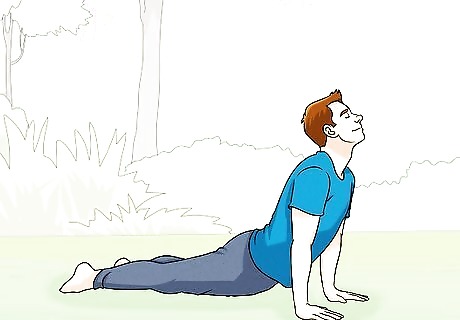
views
Envision the life you want.

Think about where you are now and what you want from the future. If you can picture how you’d like your new life to be, it’ll be easier to get there. Empowerment expert Nicolette Tura recommends being honest about where you’re at currently and what challenges you’re facing. Then, think of your highest vision for yourself in all areas of yourself. What does it look like? Start thinking about the big picture, then work out more details. Visualizing your goals can give you a lot of power toward accomplishing them—and it will also help you be very clear on what goals are the most important to you. Be as specific as possible about what you want, but don't be afraid to change your vision if you find yourself pulled in a new direction. Tura also recommends asking a few questions to figure out what you want. “Where in your life do you feel unbalanced? Are you feeling unfulfilled? Does a relationship feel stagnant? What’s in your way?”
Determine your core values and priorities.

Ask yourself if your life is aligned with those values. Your core values are the beliefs and convictions that guide your thoughts and behaviors throughout life. In short, what really matters to you? Most people have about five to seven core values. Figure out what those values are by thinking about what you really stand for; then, ask yourself if your life reflects those beliefs. If one of your values is spending time with your family, but your job makes you miss important milestones and special occasions, you might examine whether you're satisfied with your career. Although values are things you believe deeply, they can change over time. If you're doing a life reset, it might be time to reconsider what's most important to you. Introspection is important because it helps you reset your life in the most meaningful and satisfying way possible!
Set clear goals for what you want to accomplish.

Make sure your goals are “SMART.” SMART stands for specific, measurable, achievable, relevant, and time-bound goals. When your goals are well-thought-out and planned, meeting all the above criteria, you’ll be more likely to accomplish them than you might with just a vague idea of things you’d like to do someday. Specific goals have clear expectations and defined steps. What are you trying to do? What could stand in your way, and how will you overcome that? Measurable goals are quantifiable in some way; you can track them and see when there’s progress. Achievable goals are realistic. That doesn’t mean you can’t dream big; just avoid imposing unreachable expectations on yourself. Relevant goals serve a purpose in your overall vision for your life reset. Basically, if you’re setting a goal, there should be a good reason for it! Time-bound goals have a deadline. When do you plan to reach this goal? Do you have a date or time period in mind?
Break your goals into actionable steps.

Make an action plan starting with things you can do right away. Don't get overwhelmed by focusing too much on your end goal. Instead, clinical psychologist Sirvart Mesrobian recommends backtracking to think about the specific steps you need to take to achieve those goals. Start with the first step, and don’t focus on the next until the first step is accomplished. Breaking your goals into smaller steps can help you stay focused on what you need to do and keep progressing. According to Mesrobian, it can also boost your self-esteem. This is because you’ll feel more encouraged when you see yourself knocking down smaller goals on the path to your larger ones! Include incentives and rewards for yourself for making changes. For example, if you’re quitting smoking, use the money you used to spend on cigarettes to treat yourself to a new blouse, a nice outing, or dinner with a friend.
Let go of things that don't bring joy to your life.

Simplifying your life creates more space for the things that matter. Look at your life, considering each element one by one; you can even write each thing down on a piece of paper. Consider your possessions, the situations you're in, and even the people in your life. Does each individual thing bring you joy? If the answer is no, consider how you can get rid of it. This can apply to any area of your life; you might decide whether to keep a certain shirt or participate in an activity you used to love, for example. It might help to purge certain areas of your home, like your closet or storage. Sort through your clothing; are there items you could give away to make room for things you really want? Be objective—even something that used to bring you joy may no longer serve that purpose. You’ll always have obligations in life that are less enjoyable than others. However, if anything in your life constantly makes you feel depleted or overwhelmed, it's worth reconsidering how much energy you put into it.
Take time to clear your mind.

Set aside a little quiet time to reflect on your life each day. The world is noisy and busy, and it's all too easy to fill your entire day with email, social media, TV, music, and chatting. However, it's important to take some time daily to shut out all the noise, especially when you're trying to reset your life. During that time, reflect on your goals and priorities, along with what you're doing to reach them. For instance, you might take 15 minutes at the start and end of the day and just enjoy some quiet time to yourself with a cup of warm coffee or tea.
Focus on your physical health.

Take the opportunity to make yourself a priority. When you're resetting your life, Nicolette Tura recommends making sure your wellness is being taken care of—hygiene, nutrition, and physical activities. Think about whether you’re fueling your body with foods that make you feel good or if you’re just eating for convenience. Also, make time for physical activities you enjoy a few times a week. You’ll be more likely to stick with something if you like doing it instead of simply telling yourself you need to exercise more. For example, you might take a walk around the block when the weather is nice, or meet up with friends for a stroll through the park. You might also play a sport, take a dance class, or take up cycling. When you feel good physically, it's a lot easier to make clear decisions about what you want out of life. In addition, you'll feel more confident—and empowered to make good decisions.
Practice daily self-care.

Make time to care for your mental health and well-being. Practicing self-care is critical to your quality of life—especially during a life reset. Part of self-care is seeing to your physical health (as mentioned above). Still, it goes beyond that; self-care also means ensuring your needs are met to keep yourself emotionally, mentally, spiritually, and socially healthy. Self-care means making time for activities that make you happy and stimulate you intellectually. Keep up with your hobbies, or consider mastering a new one! Social health is also part of self-care. Are you getting enough social time with other people? Do you want to make any new friends? You don’t have to be religious to practice spiritual self-care. Try mindfulness exercises, meditation, or doing yoga, for example.
Clean your environment.

Declutter your space to improve your mental clarity. A life reset is the perfect time for some spring cleaning. Living in a cluttered, messy space can really impact how you feel about your life, increasing stress and decreasing your mental hygiene. Get rid of anything you don't need anymore, and organize the space to work around your needs and how you plan to use it. When the physical space around you is tidy, it will be a lot easier to focus on other changes you want to make in your life. You'll also feel better about yourself!
Surround yourself with supportive people.

Put energy into relationships that make you feel good. When you're doing a whole-life refresh, think about the people in your life. If there’s anyone who always makes you feel uplifted and puts you in a good mood when they're around, reach out to them more often. Even just a quick call or text can help give you a boost when you need it most. You can't always avoid people who bring a toxic energy into your life. However, you can choose to limit how much time you spend around those people. When you find yourself feeling overwhelmed with worries, reach out to some of the supportive people in your life—they can help you get some perspective on what's bothering you.
Get out of your comfort zone.

Push yourself to try new things and take calculated risks. It's hard to reset your life if you just keep doing the same things you're used to. Even little changes, like checking out a new restaurant or museum, can help you get a new perspective on things. Getting out of your comfort zone will also give you more confidence and help you feel more creative. Don't be afraid to make bigger changes, though. Take that class you've been wanting to try, or print up business cards for that side hustle you've been dreaming about. If you're afraid to fail, you'll never take the chance that could lead you to big success. Believe in yourself and explore new opportunities when they arise! It might just lead to the professional (or personal) growth you’ve been trying to achieve.
Start breaking bad habits.

Learn alternatives to unhealthy behaviors. Everybody has a few bad habits, and chances are that you already know what yours are. Review your habits, identifying any negative ones you’d like to break. Then, figure out what you want to do to replace the bad habits with good ones and make an effort to do it continually until the good habits are part of your lifestyle. Bad habits like smoking, drinking to excess, overeating, and not getting enough exercise can all undermine your attempts to reset your life. Still, remember not to get too down on yourself—the way to address bad habits is through positive behavior change rather than through guilt, fear, or regret. For example, rather than feeling guilty about not exercising more, decide to include 20 minutes of walking four days per week. Don't quit just because you slip up—habits are hard to break! If you need to, start by cutting back gradually until you can give up the habit completely.
Keep a gratitude journal.

Write down something you're grateful for every day. Sometimes resetting your life is as simple as changing your mindset, and practicing gratitude can be a simple but powerful way to do that. Get in the habit of reflecting on what you're thankful for at the end of each day. If you write them down, you can then read back through your journal when you're feeling discouraged! When you look for the positive things around you, you're actually more likely to see them. This can help you start to see your situation in a fresh way, and it may give you the boost you need to reset your priorities.
Challenge your negative thoughts.

Try to replace negative thoughts with positive ones instead. If you notice yourself having a negative thought about something, turn that thought around. It takes practice, but try to follow the negative through with a positive observation about that same thing. You'll notice that when you have a brighter outlook, it’ll affect more areas of your life than you expected. For example, if you're going to visit your mother-in-law, rather than attending to the fact that her cooking is always lousy, remember that you'll be able to spend time in her lovely garden. Apply this to the way you think about yourself, too. For instance, if you make a mistake, don't tell yourself, "I never get anything right." Instead, think, "I can learn from this and do better next time."
Reflect on the past without dwelling on it.

Look for lessons in past mistakes and let go of regret. Whether you find yourself rehashing bitter experiences or ruminating on the "good old days," it's important to accept your life as it is today. If you dwell on past experiences, it can block you from moving forward. Instead, reflect on things you've been through and yourself to see if you can gain any insight that might help you avoid repeating mistakes in the future. For example, you might find that you're overextended because you have a hard time saying no to people when they ask you to do things for them. Instead of getting down on yourself about that, resolve to start practicing better boundaries with other people.
Forgive yourself and others.

Let go of any resentment you're holding onto. Resentment—whether it's towards yourself or others—drains your energy without serving any good purpose. If you've been holding a grudge, a reset is a perfect chance to examine your part of that resentment. Acknowledge how you feel and make the choice to forgive. Then, let go of all the negative emotions. Nicolette Tura recommends asking yourself a few questions. “You can hold on to this, but what is it costing you? How is it helping you? And what would it be like in your life if you at least forgave yourself in the situation?” Remember, forgiveness isn’t necessarily about someone else; it’s about freeing yourself from the power they have over you and your happiness. “You never have to tell them,” explains Tura. “You can just find ways to ceremoniously honor that [forgiveness] and move on.” It can help to talk to another person or support group about your resentments. Sometimes another person can offer insights that you can't see on your own.
Review your social schedule.

Figure out if there are any commitments that no longer serve you. A reset is a chance to clean up an overloaded agenda. Remember, your time is valuable. To do the things you want to do and reset your life, consider letting go of the people and commitments that aren’t adding value to your life anymore. Change can be a good thing; you might have something amazing waiting around the corner! If you’re happier and more satisfied with your life, you'll be more present for the people and commitments or situations you choose to keep in your life.

















Comments
0 comment